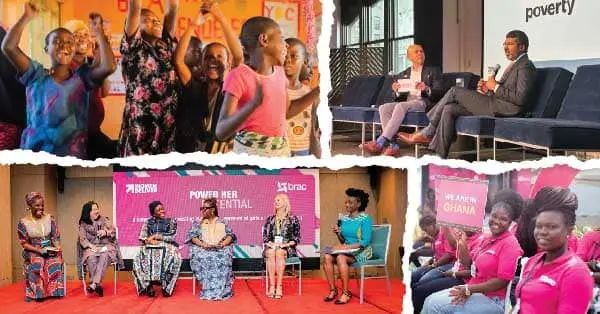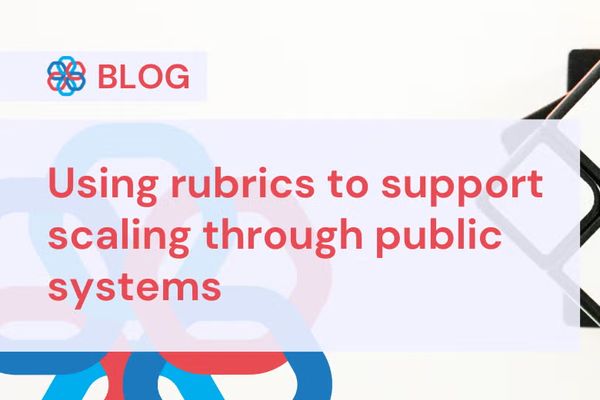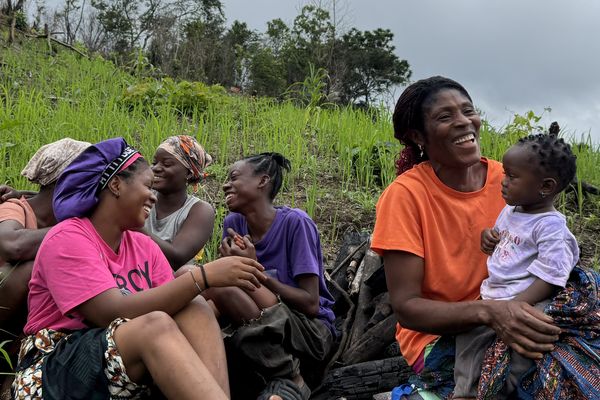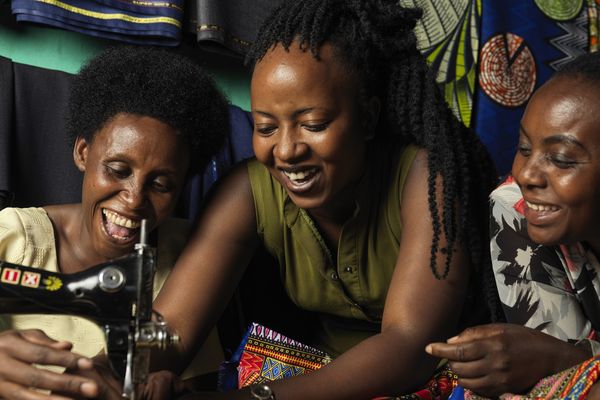In the rearview: For BRAC, for the world, and striving to reach the last mile
Date: 28 Dec 2023
Since the global pandemic altered the course of our lives, ushering in a profound shift in societal norms and priorities, individuals and communities have found themselves compelled to reassess their values and embrace innovative ways of living and working to adapt to the new reality. At BRAC International, too, we are adjusting and growing in tandem with this new normal.
In 2023, for the first time in three years, most aspects of our lives returned to normal. As we conclude this year, it is time to take stock of all that has happened, shaping not only the world but also our work. The state of global democracy and freedom continued to decline. In Africa, where we have some of our largest operations, the coup epidemic persisted, adding pressure to an already fragile economy. The civil war in Sudan has introduced a new layer of crisis in South Sudan, one of our countries of operation, with thousands of returnee refugees fleeing back home to extremely strained resources. On the climate front, we are now acutely aware that the climate crisis is no longer a future threat; we are living its reality. In countries where we work, evidence based on lived realities has taught us that without addressing the impacts of climate change, poverty alleviation efforts will see their gains reversed. We also understand that there does not need to be a tradeoff between eliminating extreme poverty and addressing the climate crisis.
At BRAC, we believe that the world’s most urgent challenges deserve the world’s most effective solutions. This era of polycrisis has taught us that relying on piecemeal development programming, limited to the whims of different donors, won’t yield real progress. Our integrated programming replaces the web of exclusions with comprehensive support, including education, health, finance, livelihoods, community mobilisation, and legal aid, with the knowledge that, without all of them, none of the services may be effective in making change. This is the approach we will always pursue with greater commitment in the years ahead.
In this year fraught with challenges, let us reflect on our share of positives. We continue to innovate and expand our work to reach people at the last mile, ensuring that our programming is not only efficient but also scalable.
Here are some of our major highlights from 2023:
AIM Programming
The Mastercard Foundation Accelerating Impact for Young Women (AIM) in Partnership with BRAC is equipping 1.2 million adolescent girls and young women (AGYW) with age-appropriate entrepreneurship, employability, and life-skills training, as well as the tools to start and scale their own businesses. The five-year (2022-2026) project will be implemented in seven countries in Africa: Liberia, Sierra Leone, Rwanda, Ghana, Kenya, and Tanzania. This year, we worked with more than 70,000 young people through more than 660 clubs in four countries – Liberia, Sierra Leone, Uganda and Tanzania. More than 1,300 trained mentors delivered a comprehensive curriculum. Neighbours, relatives and members of our participants’ communities formed over 380 youth development committees. AGYW across the four countries formed over 630 savings groups.
BRAC in Ghana
On November 2, we officially launched BRAC Ghana Savings and Loans Limited (BGSL), marking the newest country of operation for BRAC International and the seventh microfinance institution under BRAC International Microfinance. The launching event was honored with a modest ceremony in Accra, graced by the presence of our BGSL team and members of the local community. BGSL has secured its definitive license to function as a savings and loan company, effective as of September 5, 2023.
Rwanda Licensing
On October 27, 2023, a three-year NGO certificate was granted to Stichting Brac International by RGB, the board that governs NGOs in Rwanda. New NGOs are typically granted a one-year certificate; hence, we consider it a big milestone for BRAC in Rwanda.
BRAC at Women Deliver
We had a strong engagement at the Women Deliver conference with an exhibition space, panel discussions, and a side event co-hosted with the government of Rwanda. Women Deliver, a global conference that serves as a platform for advocates, policymakers, and donors to promote gender equality, offered us an opportunity to connect with the global community, share insights, and form new alliances with partners.
Microfinance operations
Microfinance is an integral part of BRAC’s holistic approach to development, equipping people who would otherwise be excluded from formal financial systems with the tools to invest in themselves, their families, and their communities. As of June 2023, we have served over 780,000 clients, marking a 9.7% increase compared to June 2022. Our year-to-date loan disbursement in 2023 achieved an 11.6% year-on-year growth compared to the same period as last year.
BRAC at UNGA ’78
BRAC was present at many high-level side events at the 78th United Nations General Assembly. We found consensus that poverty and climate change are among the planet’s most pressing issues that require immediate action. However, few key actors provided concrete steps. This problem-focused discourse unsurprisingly led folks to question if the SDGs are too ambitious and if we are destined to fail. But we believe that it is possible to get back on track to achieving SDG 1, but we must do so through multi-sectoral partnerships, intentionally focusing on those furthest behind, going deep with the communities we serve, and bringing evidence-based programmes to scale.
BRAC at COP 28
BRAC took a cross-organizational delegation to the 28th United Nations Climate Change Conference earlier this month. Twenty-one delegates attended the conference, representing BRAC, BRAC International, BRAC University and its various institutes, the Climate Hub, the Climate Bridge Fund, BRAC USA, as well as communications and partnerships. Our delegates drew attention to the realities of life at the frontline and the adaptation efforts already underway at the community level. In terms of what’s coming ahead, a snapshot at this point will likely include more focus on mobilizing private investment, efforts to turn the new energy pledges into action, integrity and transparency especially in net-zero type pledges, more work on defining, measuring, and financing adaptation, and a stronger focus on resilient food systems.
BRAC at Global Refugee Forum
The Global Refugee Forum, which took place from December 13 – 15 in Geneva, is the world’s largest gathering on refugees, designed to deliver on commitments set out in the Global Compact on Refugees. Sanna Johnson, Director of Global Resource Mobilisation and Partnerships at BRAC International, Rafiath Rashid Mithila, Head of Early Childhood Development, and Spera Atuhairwe, Country Director of BRAC in Uganda shared insights from our work in refugee settings and the lessons they hold for a world facing increasing levels of crises.



